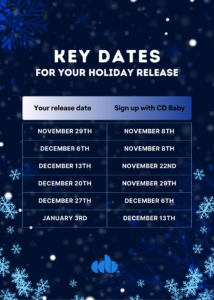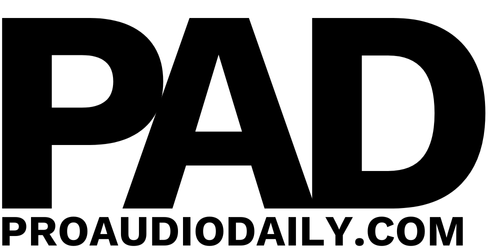
28 Nov Releasing Your Music During the End-of-Year Holiday Season
The end-of-year holiday season is just around the corner, and you’ve got some serious jingles to spread!
Whether you’re planning to drop a festive track, an entire holiday album, or just some good old-fashioned winter vibes, this is the perfect time to share your music with the world. But hold on, buddy, before you get too wrapped up in tinsel and twinkling lights, there are a couple of things you need to know to ensure your holiday release goes off without a hitch. Time is ticking, and we’ve got some urgent deadlines to discuss!
Sign up early to sleigh the competition!
If you want your music to shine as brightly as the holiday lights, we ALWAYS recommend signing up your release 3 weeks ahead of your release date at the very least.
During the end-of-year holidays, things get even crazier! Our digital partners are inundated with a flurry of content updates, extra submissions, and may need a little help from you to ensure that your release goes off without a hitch.
Some important dates you need to know
If your release date falls between late November and early January, you should sign up your content with CD Baby at least 3 weeks ahead. If you can give it 4-6 weeks, even better. Special note: If your release date is between December 22nd and the 28th, don’t be a last-minute shopper—sign up your content at least 4 weeks in advance!
*Remember, your release date doesn’t have to be a Friday; this is just an example. Plan accordingly!
End-of-Year Holiday Distribution Timeline


Understand the difference between covers and public domain tracks
You might be planning to deck the halls with some classic holiday tunes, but it’s crucial to know the difference between a cover song and songs in the public domain. Santa’s not the only one who needs to check his list twice!
What is a cover? A cover song is your recording of a song that you didn’t write, and it has been previously released in the USA with the consent of the copyright owner (the songwriter/publisher). When you’re recording a cover song and plan to make money from it, you must purchase a mechanical license. This license pays the original song’s publisher. So, if you’re thinking about covering a holiday classic, be sure to secure the necessary licenses. You don’t want to end up on the naughty list for copyright infringement!
What is Public Domain? If a song’s music and lyrics were published before January 1, 1927, it’s considered public domain in the US. This means you can record and release it without needing a license. It’s like having an all-access pass to holiday music history! However, keep in mind that only the exact version that’s in the public domain is free to use. Other arrangements and adaptations may still be under copyright, so make sure to do your research.
Please visit pdinfo.com to learn more about Public Domain works and see a list of songs that qualify. It’s important to know that if a work falls within the Public Domain, only that exact version is not protected under US copyright law. Other people may have created arrangements of that work that ARE under copyright. Do your research!
Visit here to see a list of common holiday songs and what category they fall into.
As the year draws to a close, it’s your time to shine with your festive melodies. Remember to act fast, secure the necessary licenses, and get your music out there to make the holiday season truly special. May your music be merry, your celebrations bright, and your fans dancing through the night. Happy end-of-the-year holidays, and let the world groove to your tunes!

